1991 Toyota 4Runner Tires & Services
Get Started
Complete Auto Care for Your 1991 Toyota 4Runner
-
TIRES FOR YOUR 1991 Toyota 4Runner View Tire Info GET TIRE PRICING
-
REPAIR FOR YOUR 1991 Toyota 4Runner View Repair Info SCHEDULE REPAIR
-
MAINTENANCE FOR YOUR 1991 Toyota 4Runner View Maintenance Info SCHEDULE MAINTENANCE
-
OFFERS FOR YOUR 1991 Toyota 4Runner Limited Time Tire Offers VIEW ALL COUPONS
1991 Toyota 4Runner Tires
Recommended Tires | Tire Information
1991 Toyota 4Runner Tires Sizes, Speed Ratings, and Inflation
Not sure about your 1991 Toyota 4Runner tire size? Use the following chart to find information on tire size, speed rating, and inflation.
| Trim Level | Speed Rating | Inflation in PSI F/R | Tire Size |
|---|---|---|---|
| 1991 Toyota 4Runner SR5* | None | 29 PSI/29 PSI | 31x10.50R15LT/C |
| 1991 Toyota 4Runner SR5* | None | 26 PSI/29 PSI | P225/75R15 |
|
1991 Toyota 4Runner SR5* Speed Rating: None Inflation F/R: 29 PSI/29 PSI |
|
1991 Toyota 4Runner SR5* Speed Rating: None Inflation F/R: 26 PSI/29 PSI |
* Note: these models have different tire sizes depending on vehicle options.
Recommended Tires for Your 1991 Toyota 4Runner
What tires are best for a 1991 Toyota 4Runner? Check out the following tire brands and types.
 Destination LE3
Destination LE3
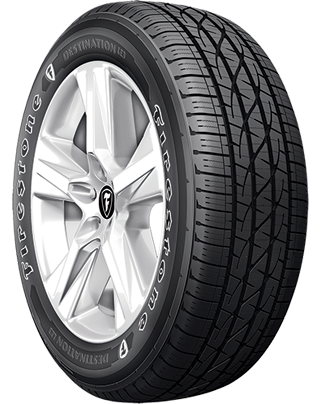
- No warranty
- All-Season
- Light Truck Tires
 Destination M/T2
Destination M/T2
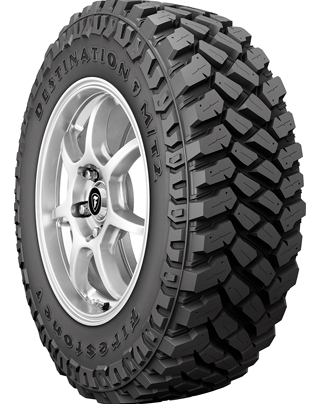
- No warranty
- All-Season
- Light Truck Tires
 Destination X/T
Destination X/T
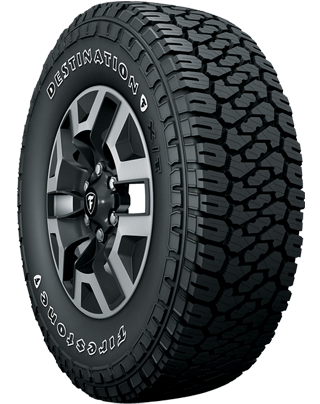
- Gold Pledge Limited Warranty
- All-Season
- Light Truck Tires

- No warranty
- All-Season
- Passenger Tires
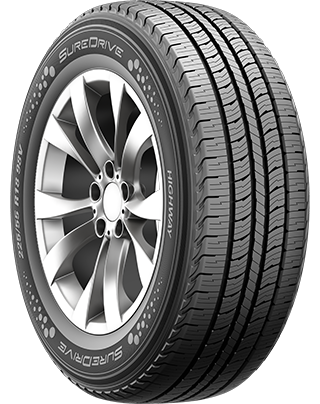
- No warranty
- All-Season
- Light Truck Tires
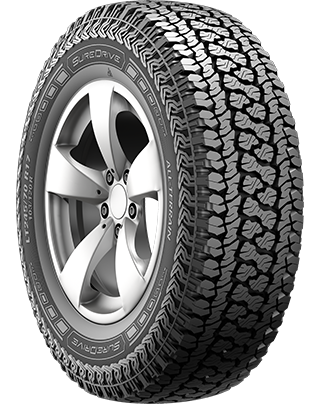
- No warranty
- All-Season
- Light Truck Tires
 Extensa A/S II
Extensa A/S II

- No warranty
- All-Season
- Passenger Tires
 OPEN COUNTRY A/T III
OPEN COUNTRY A/T III
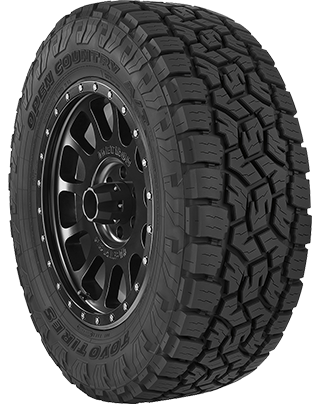
- No warranty
- All-Season
- Light Truck Tires
 OPEN COUNTRY M/T
OPEN COUNTRY M/T
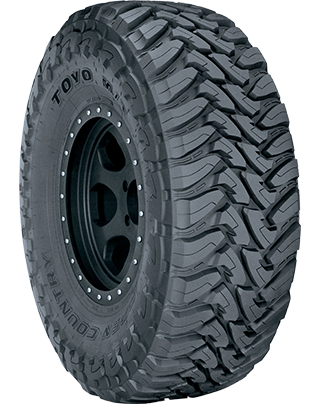
- No warranty
- All-Season
- Light Truck Tires
 OPEN COUNTRY R/T
OPEN COUNTRY R/T
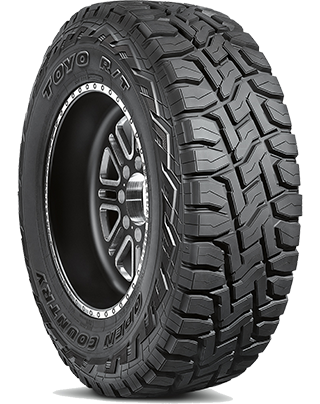
- No warranty
- All-Season
- Light Truck Tires
About 1991 Toyota 4Runner Tires
Other than getting the proper tire size, there are a couple of other factors to consider when buying Toyota 4Runner tires like where and how you drive, and what tire brand you trust most. When evaluating your driving conditions, think about where you live (countryside vs. city vs. mountains) and the kind of unexpected weather you're likely to experience. Drivers in states that fully experience all four seasons often buy two sets of tires: one for summer and one for winter. Other drivers buy one set of all-season tires instead. That way they don't have to return to the tire shop and their vehicle is always ready for sun, rain, and light snow!
Next, consider your driving style. If you're an avid off-roader who yearns to pioneer new paths, you have very different tire needs than a highway commuter who doesn't hit the hills very often. Browse Toyota 4Runner tires online or come to your nearby Firestone Complete Auto Care for help selecting the tire that's right for you.
Toyota 4Runner Installation and More
Firestone Complete Auto Care installs more tires on more cars than most other companies. We're your tire shop and a complete service center for tire installation, maintenance, repair, rotation, and alignment! Shop 1991 Toyota 4Runner tires online and schedule an installation appointment.
1991 Toyota 4Runner Tire Questions
-
Is Toyota tire inflation important? Even a tiny decrease in tire pressure could impact your safety and fuel economy. Maintaining proper tire pressure can help increase fuel economy, improve braking time, and boost tire lifespan.
-
Why are there numbers on the side of my Toyota 4Runner tires? Your tire sidewall numbers tell you the recommended load carrying capacity, speed rating, treadwear, traction, and tire size. Talk to a tire technician to learn how to read Toyota tire numbers.
-
Is there an easy way to check Toyota tire tread depth? Stay on top of your tire tread depth to help avoid a dangerous drive. You can check tread depth with a penny. Hold the penny so that Abraham Lincoln is facing you, then place your penny into a tread groove upside down. If you can see the top of Abe’s head, your tread is shallow and it might be time for new Toyota 4Runner tires. Grab a penny. Hold the so that Abe Lincon's head is facing you and his hair is pointing toward the ground. Then, place the penny into a tread groove. If you can see the top of Abe’s head, your tread is shallow and it might be time for new Toyota 4Runner tires.
1991 Toyota 4Runner Repair
How do I learn more about auto repairs? Click on a service below to read about the types of Toyota 4Runner repairs we do at Firestone Complete Auto Care.
Get Repairs for Your 1991 Toyota 4Runner
Car repairs: for many drivers, that phrase is a dreadful one. But we work to provide you with a different experience at Firestone Complete Auto Care. When it’s time for 1991 Toyota 4Runner repair services, head to your nearest Firestone location and rest easy knowing that your 4Runner is in capable hands. We'll work to evaluate the scope of repairs needed and explain your options. If a repair isn't necessary, we won't recommend it.
How Much Does Toyota 4Runner Repair Cost?
Several factors can affect the cost to repair your 1991 Toyota 4Runner, including which repairs are needed, prices of appropriate replacement parts, the labor involved, and your locale. But regardless of where you’re located, check out our website for repair coupons and offers that could save you some cash.
A few different aspects can influence repair costs for your 1991 Toyota 4Runner, like
1991 Toyota 4Runner Auto Repair Q&A
-
Do I still need scheduled maintenance even when nothing is wrong with my Toyota? Don’t neglect scheduled maintenance. Sure, you could skip out on a few recommended maintenance services, but you may pay the price later. Bring your vehicle to Firestone Complete Auto Care at recommended service intervals to address minor issues before they get out of hand and keep your car running newer, longer.
-
Should I bring my Toyota in even if I can't pinpoint the problem? You’re in your car, day in and day out. So, it’s only expected that you know your car better than anyone else! If you notice mysterious smells, strange engine noises, or other out-of-the-ordinary symptoms while driving, trust your instincts and stop into Firestone Complete Auto Care for a Courtesy Check. Catching a potential issue early could help prevent Toyota 4Runner repairs.
-
Do I have to get the repairs you recommend for my Toyota? Talk to your technician. We'll never recommend a service or repair for your 1991 Toyota 4Runner that we don't think is necessary for your safety.
1991 Toyota 4Runner Brake Repair
You might have a strong and reliable engine in your Toyota 4Runner. But if you can’t stop it, it’s as good as scrap metal. If you’re experiencing squeaky brakes or a loss of braking power, don’t wait! Safe driving and responsive brakes go hand in hand. Plus, ignoring your brake problems can result in more damage and higher brake repair bills. Visit Firestone Complete Auto Care for the right brake repair for your 1991 Toyota 4Runner. We offer a variety of brake services like pad/shoe replacement, rotor/drum resurfacing, brake fluid exchange, and wheel cylinder and brake caliper installation.
Answers to Your 4Runner Brakes Questions
-
What is causing my 4Runner to shake when I brake? Your 4Runner could shake when you brake due to worn brake pads or rotors, warped rotors, loose or worn suspension components, or faulty brake calipers. You can always schedule a free brake inspection at the first sign of strange brake behavior.
-
How often do I need to replace my 4Runner brake pads? Brake pads generally last between 30,000 and 40,000 miles. Your driving can affect how long your 4Runner brake pads last, though. For example, mainly driving on highways and gradually braking can help increase the lifespan of your brake pads, and carrying hefty loads or riding your brakes can shorten it.
-
Can brake fluid leak when my 4Runner is off? Your 4Runner has a closed hydraulic brake system, meaning you should not have a brake fluid leak under normal conditions. However, parts of your brake system can wear out over time or become damaged, which can lead to a brake fluid leak.
When to Get Toyota 4Runner Drivetrain Repairs
You don't want to go to just anyone for drivetrain repair. Drivetrains for front, rear, and all-wheel-drive and 4WD vehicles are all different. You want to go to Firestone Complete Auto Care. We can help repair all of your 1991 Toyota 4Runner drivetrain components Your Toyota could be crying out for driveshaft repair if you notice vibration as your vehicle accelerates, clunks when shifting, heavy vibrations in your floorboards, or resistance when turning.
Questions About 1991 Toyota 4Runner
-
What are the symptoms of a damaged Toyota drivetrain system? Noises toward the back of your Toyota 4Runner, leaking fluid, trouble turning — these could all be signs of drivetrain damage you want to address. Take action before something more severe happens.
-
Why is my 4Runner malfunction indicator light (MIL) on? A multitude of problems can activate your 4Runner’s malfunction indicator light (better known as the check engine light), including issues with the engine, transmission, sensors, electrical system, or connectors.
-
How worried should I be about a drivetrain malfunction in my 4Runner? If you experience a drivetrain malfunction in your 4Runner, it is important to have it inspected by a professional mechanic as soon as possible to identify the underlying cause and perform the necessary repairs. Driving with a malfunctioning drivetrain can be dangerous and cause further damage to your car.
1991 Toyota 4Runner Wheel Alignment
An alignment involves making adjustments to your Toyota 4Runner's suspension system, which serves to attach your wheels to your vehicle. When your car has an alignment service, the individual angles of your tires are adjusted so that they come into contact with the road in just the right way — the way Toyota intended them to. When you bring in your 1991 Toyota 4Runner, we’ll perform an alignment check first. Then, we’ll adjust the angles as needed until they match recommended measurements from Toyota.
Questions About Toyota 4Runner Alignment
-
What can knock my Toyota 4Runner out of alignment? When it’s safe to do so, avoid driving over potholes or hitting curbs. These road obstacles can wreak havoc on your wheel alignment, as can wear and tear from rough road conditions.
-
How frequently should you get a wheel alignment for your 4Runner? Check your 4Runner owner's manual for Toyota's recommended interval. It's generally a good idea to check your alignment every 6,000 miles or 6 months, depending on which comes first.
-
Do you need to get your 4Runner wheels aligned when you get new tires? While you don’t necessarily need to get an alignment when putting new tires on your 4Runner, it’s still a good idea. Ensuring your wheels are properly aligned can help support optimal handling, tire wear, and fuel efficiency.
Engine Repairs for Your 1991 Toyota 4Runner
If your 1991 4Runner engine needs repairs, our technicians will make sure you understand what’s going on before they start working on your engine. We make recommendations, but you make the final decision. If a repair isn’t urgent right now, we’ll let you know. If it's necessary for your safety, we'll make sure you understand that, too. We seek to give you all the info you need to make a smart decision about our services. Choose Firestone Complete Auto Care for Toyota 4Runner engine repairs and you can feel confident knowing that we use Toyota-approved parts and components like the serpentine belt, motor oil seal, fuses, or other parts.
1991 Toyota 4Runner Engine Q&A
-
Why does the check engine light in my 4Runner turn on when I start my car? Generally, your check engine light turning on upon ignition is not a bad thing. It’s just your 4Runner firing up its circuits. The light should turn off in a bit, but come see us if it doesn't.
-
Are Toyota 4Runner engine noises bad? Strange engine sounds can be a sign something’s off in your Toyota 4Runner. Knocking or tapping could be a symptom of low oil. A high-pitched whistle could signal an intake leak or misaligned belt. Squealing can be traced back to a loose fan belt, and grinding might be a sign of brake problems rather than engine issues.
-
What could damage a Toyota engine? Certain driving habits can damage your engine and should be avoided. These habits include 'running on fumes,' revving the engine while still in Park, or pushing 'the pedal to the metal' before the engine has warmed up. Help sustain your engine’s performance and efficiency by staying miles away from these bad driving practices.
1991 Toyota 4Runner Tire Repair
If your 1991 Toyota 4Runner is in need of a tire inspection or possible flat tire repair, Firestone Complete Auto Care has your back. There’s a chance your tire could be plugged and patched (rather than replaced). Our technicians can inspect your tire and let you know if it is safe to repair. To start, we’ll consider the location of tire damage, the type of issue, the size and scope of the damage, and the amount of wear on your tires.
If we determine that your 1991 Toyota 4Runner tire can be safely repaired, the repair process is actually fairly simple: (1) Remove the tire from the wheel for inspection and repair, (2) fill in the area that’s been punctured to prevent damage from moisture, and (3) seal the inner liner with a repair unit to prevent air loss.
Frequently Asked Toyota 4Runner Tire Repair Questions
-
What happens if I drive my Toyota on a flat tire? Driving on a flat or underinflated tire can put extra stress on your wheels and alignment. While it’s sometimes necessary to drive a short distance on a flat tire to get to a safe place, don’t take any other trips in your 4Runner until you can have the flat tire repaired or replaced.
-
Will a temporary sealant fix my Toyota's flat tire? Temporary sealants will solve your problem… for a little bit. If you’ve seen temporary or emergency tire sealant before (it usually comes in a can), it can be tempting to turn to this as a solution for your flat tire. Keep in mind that these fixes could buy you some time to get to Firestone Complete Auto Care for a proper repair, but they could also cause some harm in the process (for example, damage to your TPMS). Plus, using a product like this could void your tire warranty.
-
What is causing the tires on my 4Runner to keep losing air? Possible reasons for your 4Runner tires continuously losing air include a leaking valve steam, wheel damage, and a puncture or hole in the rubber.
1991 Toyota 4Runner Maintenance
You want your Toyota 4Runner to last as long as possible. If you put in the effort to keep up with proper maintenance, you could hit 200,000 miles (or beyond!) in your 4Runner.
Guide to 1991 Toyota 4Runner Scheduled Maintenance
Instead of waiting for an issue to arise with your 4Runner, you can stay ahead of problems before they even begin. Rely on the recommended maintenance schedule that’s been created just for your 1991 Toyota 4Runner! The recommended maintenance schedule is put together by Toyota, your vehicle manufacturer. Scheduled maintenance services can vary depending on driving conditions, climate, and other factors; however, recommended maintenance usually includes services like fluid exchanges, filter changes, new brake pads, oil changes, and tire rotations. Staying on track with routine service appointments can help your 4Runner perform better, increase your vehicle safety, and prevent common 1991 Toyota 4Runner problems.
Essential Maintenance to Keep Your 1991 Toyota 4Runner Running Newer, Longer
Come to Firestone Complete Auto Care for manufacturer-recommended routine maintenance on your 1991 Toyota 4Runner and a skilled technician will start the appointment with a Courtesy Check. This Courtesy Check can establish a baseline of what may need to be addressed during your service appointment. During a Courtesy Check, we’ll always check your battery, then we’ll move on to inspect your 4Runner’s head and tail lights, tires, fluid levels, alignment, and windshield wipers.
Firestone Complete Auto Care is your spot for 1991 Toyota 4Runner maintenance. So visit us regularly, or visit us urgently. Many locations are open on weekends and in the evening.
Questions About 1991 Toyota 4Runner Maintenance
-
What do I do if I hit a pothole in my Toyota 4Runner? Watch out for pothole damage. If your 1991 4Runner is pulling to one side or the other, your tires or suspension system could be calling out for help.
-
When does my Toyota 4Runner need high mileage oil? If your Toyota 4Runner has ticked past 75,000 miles, consider switching to high mileage oil at your next oil change to give your engine what it needs to go another 75,000 (or more!). High mileage oil: make it a high priority!
-
Can Toyota dashboard warning lights wait? Don't ignore dashboard warning lights! Bring your Toyota 4Runner in for a diagnostic code scan as soon as a dashboard warning light flashes on, whether it's your check engine or battery light. Dashboard lights alert you to trouble under the hood.
Battery Size & Replacement for 1991 Toyota 4Runner
Not sure what battery to get for your Toyota 4Runner?
| Battery | Engine | Warranty | Cold Cranking Amps | |
|---|---|---|---|---|
| 24FT-5 | L4/2.4L | Replacement 24 months | Performance months | 600 |
| 25-1 | V6/3.0L | Replacement 24 months | Performance months | 550 |
Car Batteries for 1991 Toyota 4Runner
Generally, car batteries last from three to five years. You want to replace your 1991 Toyota 4Runner battery before it fails and leaves you stranded. Pay attention to clues that your battery is on its way out. A lagging starter, an illuminated check engine light or battery signal, bloated battery case, corrosion-covered posts, or dim headlights may all indicate that your battery is on its last leg.
Plus, at Firestone Complete Auto Care, we’ll test your battery for free. Visit us for a complimentary battery check and, if needed, a replacement battery for your 1991 Toyota 4Runner. Automotive batteries are just one of our many areas of expertise. Our technicians are familiar with Toyota-specific recommendations for 4Runner battery cold cranking amps and reserve capacity. Get help identifying the type and size of battery that's best for your 4Runner, and schedule a weekday or weekend battery replacement service for your car.
Top Toyota 4RunnerCar Battery Questions
-
Why doesn’t my Toyota 4Runner battery stay charged? A battery that won't hold a charge is almost as good as dead. The battery might be old. Or, you may have a habit of leaving your car doors open and the lights on overnight. Stop by for a free battery test at your local Firestone Complete Auto Care to learn more about the state of your battery.
-
How long do car batteries last? A car battery normally lasts three to five years, but this number can vary based on battery type, your driving habits, and battery maintenance.
-
Why is there white, crusty buildup on my 4Runner’s battery post? A chemical reaction between battery acid and the air can cause a white, crusty buildup to form on the terminals of your 4Runner car battery. This buildup — known as corrosion — can impede the flow of electricity and cause a range of issues, from poor performance to premature battery failure.
1991 Toyota 4Runner Oil Change Service
Toyota recommends having your 1991 Toyota 4Runner’s motor oil changed at regular intervals. No matter the mileage, your 4Runner may need its oil changed ASAP if your check engine light is on, you hear knocking sounds coming from the engine, smell oil inside the car, or notice an unusual amount of exhaust. You might need an oil change more frequently than what’s recommended by Toyota if you regularly haul heavy loads, drive in dusty areas, enjoy off-roading, or go at low speeds on long distance trips.
Whether you need high mileage oil, synthetic oil, or conventional oil, you'll find the right 1991 Toyota 4Runner motor oil at Firestone Complete Auto Care. Talk with a teammate and consult your owner's manual before picking a motor oil. At Firestone Complete Auto Care, you can choose from the following oils: Quaker State® Advanced Durability™ conventional oil, Pennzoil® High Mileage Vehicle® motor oil, Pennzoil Platinum® Full Synthetic motor oil with PurePlus™ Technology, and Shell Rotella® heavy-duty engine oil. In an oil change service, a technician will change your 4Runner's oil, replace and recycle your used oil and filter, check all of your other filters, refill vital car fluids, and visually inspect the rest of the vehicle. Let the experts take care of your 4Runner’s engine by making an oil change appointment today.
Oil Change Q&A for Your 1991 Toyota 4Runner
-
Why is the oil light on in my Toyota 4Runner? Your Toyota 4Runner oil change reminder light may come on if you're overdue for an oil change. The oil pressure light will typically come on if the oil level in the engine is too low, the oil pump is failing, you have a clogged oil filter, or there's a faulty oil pressure sensor.
-
Can I change my Toyota 4Runner oil at home? Changing engine oil at home isn’t as simple as it’s made out to be. You’ll have to figure out how to properly dispose of the oil and buy special tools. Having your oil changed professionally can not only reduce the risk of something going wrong during the service, but it’ll also help your car perform smoothly down the road.
-
Why is my Toyota 4Runner exhaust smoke grayish or blue? There could be an oil leak and your engine is burning oil. Time to have a qualified technician check things out. The leak could be caused by several issues like leaking valve seals, damaged piston rings, or worn cylinder walls.
1991 Toyota 4Runner Tune-Up & Engine Service
Regular engine tune-ups can optimize your 4Runner’s power on the road. Your local Firestone Complete Auto Care offers a range of engine tune-up services for your 1991 Toyota 4Runner. The first is the standard Firestone Tune-Up. This includes the installation of new spark plugs and a visual inspection of your engine’s components, plus a lifetime warranty on parts*. The second service focuses on your 4Runner's filters, specifically replacing the air filter and fuel filter. Our third service is a thorough cleaning of the fuel system. During this type of tune-up, we use a three-step process to get rid of harmful varnish, dirt, and carbon deposit buildup in your 4Runner’s fuel injectors, throttle body, and throttle plate. The result? Restored fuel system performance. Consider this when choosing a tune-up service for your 4Runner: your vehicle’s maintenance record and mileage can determine which service is best. Talk to a technician about your driving style, mileage, and service history to learn more about your vehicle's specific needs.
*Ask a Firestone Complete Auto Care teammate about full terms and conditions for warranties.
1991 Toyota 4Runner Engine Tune-Up Q&A
-
What happens if my Toyota 4Runner spark plugs fail? When it’s time to replace the spark plugs, don’t delay. These small (but vital!) parts provide the electric spark that your car needs in order to start, and old spark plugs can prevent your car from starting at all. Replace spark plugs on time or about every 30,000 miles or so.
-
What should I do if I see leaks under my 4Runner? Don't ignore puddles of fluid under your Toyota 4Runner. It could signal a coolant leak, brake fluid leak, or an oil leak. Let any one of these leaks linger and it could cause engine damage.
-
How often do Toyota 4Runner fuel injectors need to be cleaned? The frequency at which car fuel injectors should be cleaned can vary depending on several factors, including the type of fuel used and the driving conditions. Some manufacturers generally recommend a fuel system cleaning as part of your general car maintenance, or as needed based on symptoms of poor fuel system performance.
1991 4Runner Toyota Steering & Suspension Services
When you first bought your 1991 Toyota 4Runner, you probably enjoyed a smooth and steady ride. Lately, though, your ride’s been feeling a little bumpy. Perhaps your 4Runner feels bouncy, leans to one side, or makes a weird sound when you drive over a speed bump or turn. The first sign of trouble is the best time to bring your 1991 Toyota 4Runner in for steering and suspension repairs. We’ll get to the source of your car problems and, if your 4Runner suspension system needs repair, we’ll go over the services you need and how much they will cost before we do any work.
1991 Toyota 4Runner Steering & Suspension Questions
-
Why is my Toyota 4Runner bouncing excessively? If your shocks or struts are in bad shape, they can’t dampen road bumps like they should. This can cause your 4Runner to bounce more than usual.
-
What can cause the front end of my 4Runner to dip forward when I apply the brakes? As you brake, the forward momentum of your 4Runner combined with its weight sends a ton of force to its front end. A damaged or worn suspension system can cause the front end to compress and dip even further.
-
What role do tire pressure and tread depth play in my Toyota's suspension? Proper tire care can reduce strain on the suspension system, and also alert you to the need for new tires. Uneven tire wear is one sign of steering and suspension system problems, but it can also contribute to more.
Convenient & Local 1991 Toyota 4Runner A/C Service
Our trained technicians will do what they can to solve your 1991 Toyota 4Runner A/C problems. During this initial A/C performance check, we’ll look at the state of your 1991 Toyota 4Runner’s A/C system to evaluate what repairs are necessary (if any). This check includes a visual inspection, performance test, and pressure and leak test.
Let's say we repair your 1991 Toyota 4Runner A/C system. We will also perform an A/C evacuation and recharge. To do this, one of our technicians will remove the refrigerant in your A/C system (if there is even any left to remove). Then, they’ll use Toyota’s specifications to evacuate the system. Finally, we’ll recharge the A/C system with new refrigerant.
Frequently Asked Questions for 1991 Toyota 4Runner A/C Systems
-
Why do I get hot air from my 4Runner A/C? If your car’s air conditioning isn’t blowing cold air at all (or it tries, then turns warm), you could have a clogged expansion valve, a faulty compressor clutch, a leak, or a malfunctioning fuse in the system.
-
What can cause an A/C system leak? Over the years, the rubber seals and gaskets in your 4Runner’s A/C system naturally degrade. Moisture can get into the system and cause a malfunction, or parts can simply wear out so that your system no longer seals properly.
-
What is causing my 4Runner’s A/C to only work when the car is in motion? Damaged or worn components in your 4Runner’s electrical or air conditioning system can cause the A/C to only work when the car is moving. You may be dealing with low coolant or a faulty cooling fan.
1991 Toyota 4Runner Transmission Service
The transmission delivers power from the motor to your wheels so that you can drive at your desired speed. Because your transmission is responsible for converting the right amount of power into the right amount of speed, a tiny transmission issue can take a major toll on your car’s performance. 1991 Toyota 4Runner transmission problems can show up as shifting delays, jumping or grinding during acceleration, the car shaking at any speed, or a burning smell or whistling sounds coming from under the hood. If you ignore Toyota 4Runner transmission issues you could see your fuel economy decrease or find that you can't drive your 4Runner at all. Our technicians are trained to service 1991 Toyota 4Runner transmission systems according to vehicle manufacturer recommendations. As soon as you suspect something’s wrong with your 4Runner’s transmission, book an appointment at your local Firestone Complete Auto Care to help diagnose, treat, and prevent major transmission issues.
1991 Toyota 4Runner Transmission Q&A
-
Does my 4Runner's transmission fluid need to be inspected? Regularly checking and exchanging your 1991 4Runner’s transmission fluid is one of the best ways to help the transmission system perform. Some technicians would say that between 30,000 and 60,000 miles is a good timeframe for having your Toyota's transmission fluid checked and replaced, but that timeline can vary depending on how your vehicle is used and your manufacturer’s recommendations. The good news is that transmission fluid leaks are affordable to repair and easy to spot.
-
Can transmission fluid leak from my Toyota 4Runner? Yes. Toyota 4Runner transmission fluid can leak over time and potentially cause transmission issues. Worn or damaged seals, a loose or damaged transmission pan, a cracked transmission housing, faulty transmission cooler lines, or an overfilled transmission could cause transmission fluid leaks.
-
Should I avoid driving my Toyota 4Runner if there is a transmission fluid leak? Driving with a transmission fluid leak is not recommended. Transmission fluid is essential to the proper operation of the transmission system, and a leak can cause serious problems, including reduced performance, overheating, and potentially transmission failure.
Vehicle Inspection for 1991 Toyota 4Runner
When you bring your vehicle to Firestone Complete Auto Care for any service, we’ll automatically do a multi-point Courtesy Check. To start, one of our technicians will check the battery in your Toyota 4Runner to find out how much charge is remaining on it. The check will continue with a visual inspection of your Toyota 4Runner's lights, windshield wipers, filters, fluid levels, belts, hoses, tires, and alignment.
We perform a Courtesy Check any time you bring your car to a local Firestone Complete Auto Care for service, but we can also dig deeper and perform a Complete Vehicle Inspection on your 1991 Toyota 4Runner if you prefer. In addition to a visual check of everything that's included in a Courtesy Check, a Complete Vehicle Inspection also includes an examination (by hand!) of your steering and suspension system, brakes, and exhaust components. The goal of this type of inspection is to unearth significant issues that might need immediate attention in order to prevent further damage.
Depending on your location, you may be able to take care of your state inspection or safety test at your local Firestone Complete Auto Care. Specific requirements for these types of inspections vary by state.
FAQs for 1991 Toyota 4Runner Vehicle Inspections
-
How do I know if I should have an inspection on my Toyota 4Runner? You drive your car, day in and day out, so you know it best. If you notice unusual engine noises or you can’t shake the feeling that something is 'off,' start with a Courtesy Check to stay ahead of potential issues.
-
Help! My 1991 Toyota 4Runner failed the state inspection test. Can you get it to pass? There's a good chance we can. Stop by for a full system inspection and we'll get to the root of the issue.
-
When should I get a complete vehicle inspection for my Toyota 4Runner? The best time to get a complete vehicle inspection for your Toyota 4Runner is before going on a road trip for the peace of mind. Another great time is when something abnormal occurs, and you can't pinpoint the issue. You might notice new dashboard lights, hear strange noises from under the hood, or your steering wheel doesn't feel like it once did.
1991 Toyota 4Runner Radiator Service
Regular, proactive service on the radiator in your 1991 Toyota 4Runner is crucial to keep your engine in the best possible shape for years to come. To keep your radiator functioning, Toyota recommends replacing your antifreeze or coolant at scheduled intervals but you can also take note of any signs your radiator is going bad. You might be driving around (or about to be stranded) with a failing radiator if you see coolant leaks under your car, high engine temperatures, or a dashboard light that indicates low coolant.
If you bring your vehicle to Firestone Complete Auto Care, we start with a comprehensive inspection of your Toyota 4Runner’s cooling system. Then, we’ll move on to a machine-powered coolant exchange. Finally, we’ll refill the flushed sealants, lubricants and chemicals, then do a pressure check to catch any possible leaks. From the heater core to the radiator cap, your 1991 Toyota 4Runner is in good hands at Firestone Complete Auto Care.
1991 Toyota 4Runner Radiator Q&A
-
What does an illuminated coolant temperature light mean for my Toyota? Pay attention to the temperature gauge and lights on your dashboard. If a low coolant warning light comes on or your dashboard temperature gauge keeps rising, it’s likely that your engine is about to overheat (and could leave you stranded on the road). Wait for the engine to cool down, then have your coolant system checked immediately at your nearest Firestone Complete Auto Care.
-
My 4Runner overheated! What can cause that? Low coolant, a damaged cooling fan, a faulty water pump, a malfunctioning thermostat, or a clogged radiator could all cause your Toyota 4Runner engine to overheat.
-
My 4Runner radiator sounds like it's rumbling or boiling! What's up? If your radiator sounds like it's boiling or rumbling, you could have air pockets in the cooling system of your 4Runner. You might also have a damaged radiator cap (super easy to fix!) or a clogged radiator.